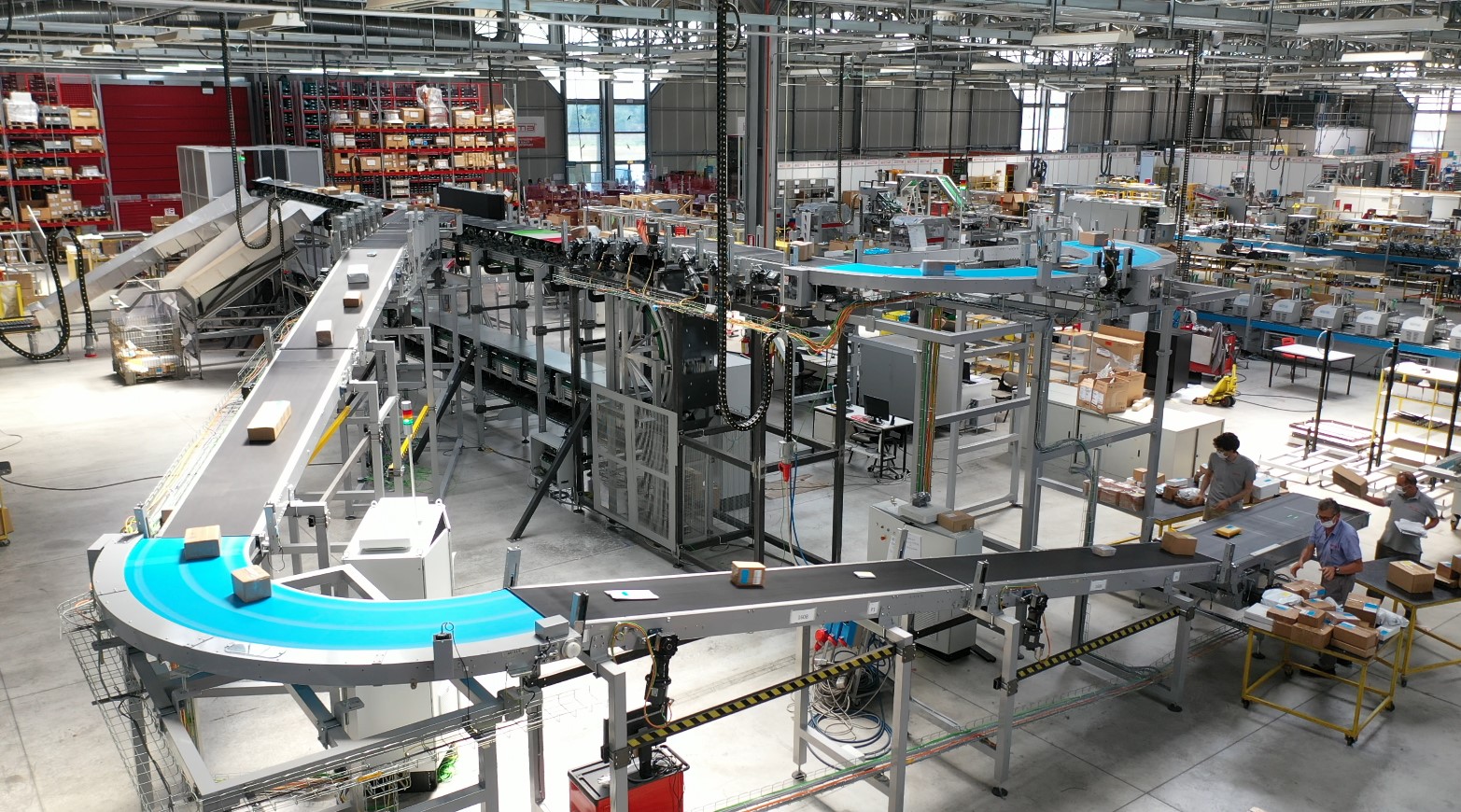Editor Peter MacLeod visited Luxembourg for the first time to see at close quarters an automated warehouse system installed for Auchan by Exotec, where the ‘skybot’ rides high.
I’m never happier than when touring a warehouse, especially one packed with automation. Furthermore, the chance visited a country for the first time meant the invitation from Exotec to visit French retailer Auchan’s eCommerce fulfilment centre on the outskirts of Luxembourg city was irresistible.
Auchan is one of the biggest grocery stores in France with over 4,000 locations across 17 countries. Founded in 1961, the chain is known for carrying a rotating stock of groceries, clothes, home goods, electronics, and pharmaceuticals. Its Luxembourg operations started in 1996 and today comprise three supermarkets, 17 MyAuchan fuel stations, one MyAuchan convenience store, and seven Auchan Drive pick-up points. Furthermore, its home delivery network serves the entire country.
Its Auchan Drive pick-up points place particular stress on its logistics operations, and an increase in business fuelled by the Covid pandemic started to highlight the inadequacies of its mainly manual picking operations. So it called in French robotics expert Exotec to automate its ambient operations and allow it to guarantee delivery timeslots for its growing online customer base.
Trigger Points
Three factors triggered the decision to automate. Firstly, the existing operation featured numerous bottlenecks, principal amongst them being the labour shortage. An extremely low rate of unemployment in Luxembourg means recruitment is challenging, and the roles offered were not particularly attractive. Pickers worked over two storeys, and had to walk up to 15km a day to fulfil their tasks.
Secondly, Auchan’s ambitious growth strategy meant its DC had to be future-ready. The implementation of its new auchandrive.lu website, new store openings and the expansion of its delivery-at-home service meant that volumes were expected to grow.
Thirdly, the warehouse – which was only inaugurated in 2019 – needed to be optimised to make better use of available space and improve the order preparation quality.
Exotec was brought in with the goals of achieving an improved quality of service and enabling a more complete range of goods to be offered to Auchan’s customers. To meet these, Exotec implemented a solution using its Skypod AMR solution, the first in the country. It promised to bring increased productivity in receiving and preparing an order, improved returns management, a reduction in footprint of the storage area, consolidation of the warehouse space from two storeys to one, and an overall optimisation of the business.
The solution proposed by Exotec was tailored not only to suit operational requirements, but also takes into account the physical characteristics of the site, for example the location of columns and roof height. A fresh layer of concrete was poured onto the existing floor to ensure it was of the necessary strength and to achieve super-flatness on which the bots could operate optimally. A dense racking system was constructed, enabling 37 bots to service up to 15,300 bins, and deliver to three picking stations.

Exotec was instructed to ensure goods are shipped to the end user in its existing iconic red collapsible totes. Unfortunately, whilst they might be iconic, their design renders them utterly unsuitable for travelling through an automated warehouse, particularly when rattling over rollers. So Exotec devised a workaround in which each red tote is placed on a blue tray compatible with the system. Whilst it may take one operative an hour a day to carry out the task of putting totes on trays, at least it means Auchan’s brief to retain its boxes could be met.
The Skypod bots rise vertically up the racking under their own power, extend forks to retrieve the standard totes, and bring them to the picking station. Four orders can be fulfilled simultaneously at each station, with a monitor indicating to the picker the number of items to pick. These are then placed into the red totes for dispatch to the customer, using a light system to identify in which of the four to place the goods. Items that need to be specially wrapped, such as wine bottles, are indicated to the picker on the monitor. When each order is fulfilled, the tote is automatically sent to goods-out and an empty tote takes its place.
The bots operate autonomously, and are put on charge for a standard five minutes every hour to ensure maximum uptime. The warehouse space occupied by the automated system is just 40% of the area previously taken up by the manual operation.
Execution
The performance improvement enjoyed by Auchan following implementation of the Exotec Skypod system in July 2024 was considerable. Order picking times are optimised, allowing Auchan to offer guaranteed delivery slots of three hours. It has the capacity to handle up to 915 bins per hour across the three picking stations, and by centralising the picking and restocking operations, it reduced inventory errors and improved stock accuracy.
Productivity before the Exotec solution was implemented was 105 picking lines per hour; this has leapt to 305 picking lines per hour per station, an increase of almost 300%. Replenishment was also similarly boosted, jumping from 25 lines per hour to 60, an increase of 240%.
An added benefit came from the flexibility of the system, which enabled preparation and reception to be carried at the same workstations. As well as helping the retailer to manage headcount at the facility, the automation reduces drudgery by eliminating repetitive manual tasks and physical strains. The pickers no longer have to handle heavy products or work in uncomfortable positions, and internal travel has been eliminated.
The Exotec system has simplified the management of customer returns by automatically prioritising returned items so they can be rapidly reintegrated into the active stock.
Nicolas Gueuzurian, marketing director & eCommerce director for Auchan Retail in Luxembourg, explains why the retailer opted for the Exotec system: “It was mainly because we wanted to put in only one system to optimise the warehouse. Some of the other companies proposed two or three systems, but we didn’t want to deal with more companies and have a more complex system. Secondly, Exotec has a lot of experience with other retailers facing the same challenges as us doing the same job.”
He identified three main benefits of the new operation: “The main one is, thanks to the new system we are able to check inventory all day long, which improves the accuracy of the stock. The second is the quality of the order; when you have fully manual picking there are a lot of human errors. With this kind of system, you cannot have human error directly. The third one is productivity, because we are much faster, and it allows us to make sure that we are always on time to deliver the promise of the client.”
Automated warehouse toured – tick. Editor impressed by a neat solution – tick. New country visited – tick. All in all, it was a very satisfactory trip.
similar news
LAC to represent Exotec in the UK








